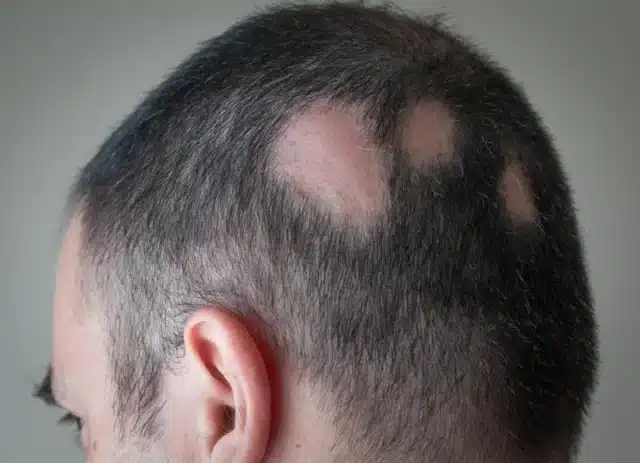Alopecia is a medical term used to describe hair loss. It can occur on the scalp or other parts of the body. There are several types of alopecia, each with different causes and patterns of hair loss. The most common types include:
1. Androgenetic alopecia (male/female pattern baldness): This is the most common form of hair loss and is often hereditary. It typically results in a gradual thinning of hair over the scalp.
2. Alopecia areata: In this type, the immune system attacks the hair follicles, causing sudden patchy hair loss on the scalp or other areas of the body.
3. Alopecia totalis: This refers to the complete loss of hair on the scalp.
4. Alopecia universalis: This is the most severe form, leading to complete hair loss on the scalp and body, including eyebrows, eyelashes, and other body hair.
Treatment for alopecia depends on the type and severity of the condition. Here are some common treatment options:
1. Medications: In cases of androgenetic alopecia, medications like minoxidil and finasteride may be prescribed to slow down hair loss and promote hair regrowth. For more permanent solutions, many individuals turn to hair transplants Bristol to restore natural hair density.
2. Corticosteroids: For alopecia areata, corticosteroid creams, injections, or oral medications can help reduce inflammation and stimulate hair regrowth in affected areas.
3. Immunotherapy: This involves applying a chemical irritant to the affected skin to trigger an immune response and encourage hair regrowth.
4. Topical creams and foams: Some treatments aim to stimulate hair growth when applied directly to the scalp.
5. Hair transplant: In certain cases of androgenetic alopecia, hair transplant surgery may be an option to transplant healthy hair follicles to areas with thinning or no hair.
It’s important to note that not all types of alopecia have a cure, and treatments may not work for everyone. Consulting a dermatologist or a healthcare professional specialising in hair loss is essential to get an accurate diagnosis and an appropriate treatment plan for your specific condition. If you’re considering surgical options, clinics offering hair transplants Manchester can provide expert advice and treatment tailored to your needs.. For those exploring long-term solutions like Hair Transplants Leicester, trusted clinics such as UKHT can help determine the underlying cause and recommend the most suitable treatment options.
(function(a,b){var c=a.keapForms||{SNIPPET_VERSION:”1.1.0″,appId:”csk945″},d=b.createElement(“script”);d.type=”text/javascript”,d.crossOrigin=”anonymous”,d.defer=!0,d.src=”https://forms.keap.app/lib/public-form-embed.js?appId=csk945&version=1.1.0″,d.onload=function(){var b=a.keapForms;b.renderAllForms?!b.invoked&&(b.invoked=!0,b.renderAllForms()):console.error(“[Keap Forms] Error: could not load”)};var e=b.getElementsByTagName(“script”)[0];e.parentNode.insertBefore(d,e),a.keapForms=c})(window,document);


